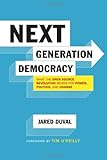I read this book on my way to the UK last week, and it really helped inform my remarks at the House of Commons. With an introduction by Tim O’Reilly, it’s a look at how open source ideas and architectures are influencing our democracy:
Thankfully, the lessons of the Internet—open standards, open-source software, and data-driven applications—are all being followed, albeit with greater or lesser focus in one project or another. (That’s true in the private sector as well.) Open APIs are being developed that will allow applications to work across the country (and eventually, internationally), rather than being bound to the systems of any one city. Projects like Code for America are working to build mechanisms for sharing code, expertise, and best practices between cities. We’re seeing new alliances between governments at the federal, state, and local levels to increase citizen services, eliminate redundancy, and reduce costs.
But it’s not all happy — he also talks about how the main focus has been on transparency and sunlight, but that that’s not nearly enough — we need to build better architectures of participation.
Yet rather than learning from its early mistakes and trying to provide for more meaningful and structured forms of public participation, the White House has since neglected the “participation†plank of the Open Government Initiative, shifting almost all of its focus to the safer realm of open data and government transparency. As the New Democrat Network has noted, the Open Government Directive “does a lot for the ‘Transparency’ part … but not much for the ‘Participation’ or ‘Collaboration’ portions … To really get the full benefit of the wisdom of the crowd, the government’s next step will have to ensure the dialogue is truly two-way.â€14 Indeed, the danger that comes with focusing almost exclusively on transparency—a vital yet insufficient goal—is that we may end up seeing the failures of our government but being left with little recourse for doing anything about them. Transparency without avenues for real participation seems a bit like watching a police interrogation from behind a two-way mirror. While you can see what is going on, you have little ability to do anything if something goes wrong. And in any case, transparency has run aground as well. Abandoning his pledge to do health care around a table on C-SPAN, the president consented to a process of congressional wheeling, dealing, and capitulation to special interests, personified most by senators like Ben Nelson and Joe Lieberman. Once the House and the Senate finally passed their divergent bills, the White House—in a rush to sign a bill—gave its blessing to skipping the conference-committee process and conducting negotiations to reconcile the two bills in private, among Democrats alone.
Obviously, I think this book is required reading for those who hope to change our government.





slide.013-tm.jpg
May 3, 17:56 › Cinsel sohbet odalar?: ?nsanlarla konu?mak çok daha fazla etkile?imli konu May 3, 17:56 › Gabile sohbet odalar?: Gerçekten herhangi bir yanl?? anla??lma veya ileti May 1, 0:45 › ????????????: An intriguing discussion is worth comment. I do believe Apr 5, 21:31 › bizim mekan: thank you very much admin.